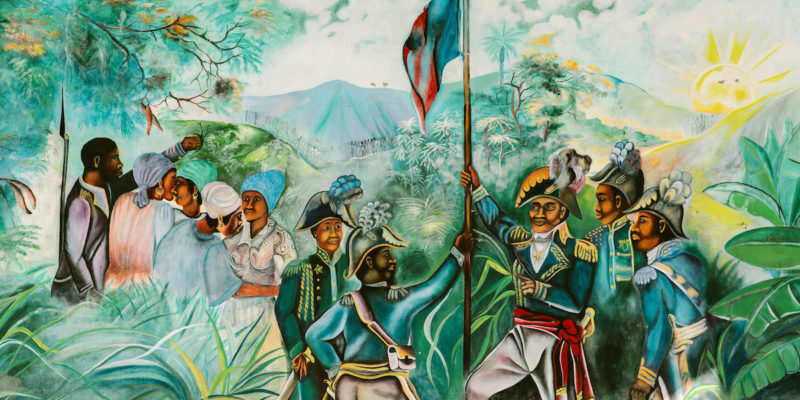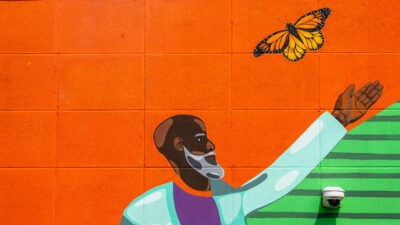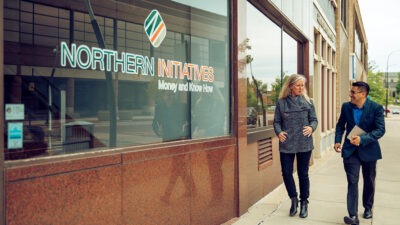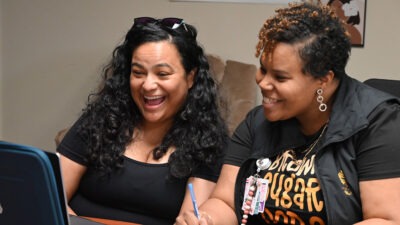Haiti’s story is beautifully complex. The Haiti of today cannot be understood without acknowledging its complete history. The W.K. Kellogg Foundation partnered with Round Earth Media to support journalism that gets to the root causes of Haiti’s current conditions. That reporting was distributed through media outlets in Haiti and the U.S., and some of it can be heard in Haiti Untold. It’s an audio documentary that also tells a story often unheard, of the resilience, the creativity and the liberation of the Haitian people.
In Haiti Untold, Haitian and American journalists bring us stories of Haitians returning to their home country from the U.S. to spur investment and economic growth, of rural disinvestment and rising urbanization, of Haiti’s bustling music scene, the #MeToo movement and innovative recycling efforts. Some of the stories unearth desperate – and rarely-discussed – inequities; others offer hope and models for change.
This hour-long audio documentary is hosted by Carline Desiré, radio host and executive director of the Association of Haitian Women in Boston, and Conrad Fox, a Round Earth media producer who spent extended time in Haiti to report on these stories.
Learn more about Round Earth Media’s unique approach and check out a partial transcript of the Haiti Untold audio special by clicking the button below. These excerpts have been edited for clarity.
[00:01]
(Bustling sounds of people and cars)
Conrad Fox: Port-au-Prince buzzes with energy. The capital of Haiti is crowded with shoppers, vendors, government workers, buses, cars, motorcycles…
Carline Desiré: And everywhere you go there’s music.
(Upbeat music plays)
Conrad Fox: I’m Conrad Fox.
Carline Desiré: And I’m Carline Desiré. You know that’s not the image we usually get of Haiti.
Conrad Fox: No. We mostly hear of negative things: It’s the poorest country in the Western Hemisphere.
Carline Desiré: It’s corrupt.
Conrad Fox: It’s chaotic.
Carline Desiré: But anyone who’s been to Haiti knows there is much more to it than that, like the resilience of the people, their fierce pride.
Conrad Fox: After all Haiti is the first place where slaves rebelled and threw off their masters.
Carline Desiré: And the first Black republic in the world.
[1:07]
Laurent Dubois: They won the war against slavery and in doing so they changed the history of the world.
Conrad Fox: So, that right there, Colleen, that huge moment in history. That seems like a good place to start this hour. The Slave Rebellion of 1791 and then the Declaration of Independence in 1804.
Collen Desiree: If you want to figure out why Haiti, my home country, is the way that it is today; so unequal, so politically unstable, and why so many people are still so poor. We need to go back to that momentous event. Laurent Dubois is a professor of history at Duke University.
Laurent Dubois: Haiti emerged right at a time when slavery dominated really the entire hemisphere. There’s slavery in North America, throughout Latin America. all the European empires were heavily invested in the slave trade.
So, certainly the fact of enslaved people rising up, overthrowing slavery, creating their own nation; the emergence of black emperors and kings, and a new sovereign state right in the midst of this plantation zone, which was the Caribbean, was deeply threatening to those who really controlled the world at the time.
They won the war against slavery and in doing so they changed the history of the world.
[02:10]
Conrad Fox: The U.S., which was terrified that the slave rebellion could influence its own slaves, was the last country in the world to recognize Haiti as an independent nation.
Carline Desiré: It took only 58 years.
Laurent Dubois: France eventually recognized Haitian independence only in return for the payment of a large indemnity. So, they essentially forced Haiti to pay, at the time it was $150 million francs. This was money that was to go to France and then paid back the former slave owners in France to pay them back essentially for the property and the enslaved people they had lost. So, it was literally former slaves paying former masters for essentially the right to be recognized as free.
Carline Desiré: That debt crippled Haiti’s development and continues to ripple through the Haitian economy today.
Conrad Fox: Yes, it’s almost as though Haiti could never quite catch up. The debt was so big, they had to borrow money from French and American banks to pay it. Haiti only finished paying it all back, with interest, around 1947, after World War II.
Carline Desiré: And there’s another thing that goes right back to those very early days, too. The huge gap between the rural and urban areas. Right after independence, most of the big sugar and coffee plantations were broken up. Small pieces of land were given to the former slaves. That’s how Haiti became a nation of small farmers with a small urban elite.
Conrad Fox: But the situation in rural areas is really tough, and these days many people are flocking to the cities. Especially Port-au-Prince. I’ve heard that almost 800 people a day are moving to live there, and while I was there, I met a family who’d done just that.
[3:49]
(Bell rings, mutters of people and birds chirping)
Conrad Fox: Chrismene Valeus owns a small piece of land in the rural town of Vèrèt, north of Port-au-Prince, but she can’t make a living from it.
(Woman speaks in Haitian Creole)
Conrad Fox: “It hardly rains anymore,” she says. “My garden is wasting away.”
Besides that, bitter land conflicts and rising labor costs just make things worse.
Chrismene Valeus: I’ve had death threats over my land. My neighbors let their animals destroy all my crops.
Conrad Fox: And so, 14 years ago, Chrismene gave it all up and come to the city with her baby son, Erbé. Their neighborhood is a jumble of narrow alleys and crumbling cement houses set to the bottom of a steep ravine.
Chrismene has lots of company. In the last 20 years, the population of the capital has doubled to more than three million people. The city’s aging infrastructure creaks under the pressure. There are daily blackouts, water shortages, the main intersections are a knot of honking, growling cars.
[5:01]
Conrad Fox: Urban growth can be a good thing. An economic motor for a developing country, but not here says Michèle Oriol She’s the director of a government agency that researches economic development.
(Woman speaks in Haitian Creole)
Michelle Orreol: When people in other countries leave the provinces to settle in the city, it’s because there’s work, but in Haiti, the cities can’t offer work to everyone. There’s no private sector to create work. It’s frightening. It’s really the worst possible moment for this urbanization.
Conrad Fox: Despite billions of dollars in foreign aid and remittances from Haitians overseas, Haiti’s economy has actually shrunk over the last two decades, not grown. A World Bank report speculates that all this outside money may have spurred consumption at the expense of creating productive industries. The lion’s share of outside money stays in Port-au-Prince, so while jobs are scarce, migrants eke out a living selling things, often to each other
Most of these kids want more than survival. They dream of becoming nurses, doctors, engineers, agronomists, and for that they need to go to Port-au-Prince.
(Sounds of transient people, cars buzzing)
Conrad Fox: The sidewalks of most main streets double as informal markets. Every square foot is taken up by somebody with a basket of vegetables, a blanket with rice piled loosely on top, old electronic equipment.
Chrismene Valeus: When I’ve got money, I sell cosmetics, underwear, sheets and curtains to my neighbors on credit and they pay me later. I buy food on credit and that’s what I eat, too, the products I buy to sell. It’s so hard to make a profit.
Conrad Fox: In Chrismene’s hometown of Vèrèt, 50 miles north of Port-au-Prince, it’s a different world. Children leap, dive and swim in a nearby river. Rice patties line the banks and farmers slosh knee-deep in the flooded field. After the cacophony of Port-au-Prince, it looks idyllic, and yet…
(Young man speaks in Haitian Creole, people talk in the background)
“There are no jobs here,” the kids say. “People can’t stay.” In the city extreme poverty has dropped to about 20%. Here in the countryside, it’s still at 70%.
Most of these kids want more than survival. They dream of becoming nurses, doctors, engineers, agronomists, and for that they need to go to Port-au-Prince. Vèrèt’s mayor, Harold Therne, says rural areas like his are neglected by the politicians in the capitol.
[7:29]
(Man speaks in Haitian Creole, sounds of nature permeate the background)
Harold Therne: They owe us six or seven months of our budget. We can’t pay our staff. We can’t start any projects. It destroys our sense of community, and that’s what’s driving people away in large part.
Conrad Fox: More than 90% of the national budget is spent in Port-au-Prince, leaving little for the countryside, and the roads to the capital are a nightmare. Sometimes more pothole than pavement. That puts hospitals, schools and markets out of reach of many farm families.
Chrismene says that in her neighborhood in Port-au-Prince, several children were recently murdered. Still, she’s glad she came.
(Woman speaks in Haitian Creole with sounds of the city in the background)
Chrismene Valeus: It’s true that Port-au-Prince is dangerous, but in the provinces, children are only brought up to farm. Here, in Port-au-Prince, there are other possibilities, other relationships. They might meet someone who can help them. They can learn other jobs. They can become someone.
Conrad Fox: And her son, Erbé, who’s now a teenager?
(Young man speaks in Haitian Creole)
He says he prefers the rivers and fields of Vèrèt, but he’s used to Port-au-Prince now. Erbé has a big exam coming up. If he passes, he’s one step closer to his dream of going to university. The test costs money and his mother doesn’t know if she can afford it, but here, at least, she has hope.
(Sounds of beating Djembe drums begin to play)
Conrad Fox: My colleague in Haiti, Vladimir Maurice Redorde contributed to that story.
[9:05]
Carline Desiré: So, this is probably a good moment to talk about the millions and millions of dollars that have flowed into Haiti over the years. Starting in the 1970s and especially after the earthquake of 2010.
Conrad Fox: Most of it came from foreign governments, from NGOs, that’s Non-Governmental Organizations, and from far flung charities and churches. You might have made a donation yourself. With the flow of money, comes a flow of people. Foreigners all intent on helping Haiti.
Carline Desiré: And many of them have done great work setting up schools, digging wells, treating patients, but as professor Dubois says…
Laurent Dubois: It’s clear that the kind of structure of aid and humanitarian assistance isn’t really working, right? It’s clear that over the last several decades you’ve had an enormous amount of money spent supposedly on helping Haiti that is not appreciably altered the circumstance or improved them.
Carline Desiré: Which is why perhaps many Haitians are suspicious of outsiders coming into the country.
Conrad Fox: So, why is this?
Carline Desiré: It’s complicated.
Conrad Fox: After the slave rebellion in 1791, the French constantly tried to find ways to restore the old plantation system in Haiti. That led to a deep distrust of any outside influence in the country. Then…
Carline Desiré: The U.S. arrives.
Laurent Dubois: So, Haitians’ deep worry that they would lose their sovereignty kind of came to be realized. That kind of nightmare came to be realized in 1915 when the U.S. occupied Haiti.
Conrad Fox: Most Americans may not know that the United States actually invaded Haiti and stayed.
Carline Desiré: For 20 years.
Laurent Dubois: The justification was the political disorder in Haiti, which was indeed intense at the time.
Carline Desiré: But there were other reasons, says Professor Dubois.
Laurent Dubois: So, U.S. banks were very involved and U.S. merchants and U.S. agriculturalists were interested in Haiti and rebuilding plantations there as well. So, there was a kind of dream essentially of this return of the plantation and that really drove the occupation.
Carline Desiré: It was a brutal and violent occupation, and the Haitians fought furiously to maintain their independence. There were protests, there were strikes, there was an armed uprising.
Conrad Fox: Eventually the U.S. pulled out.
Laurent Dubois: But that occupation left deep, deep marks on the country in many ways.
Carline Desiré: So deep that to this day Haitians are very suspicious of outsiders in their country.
[11:34]
In the best of times and the worst of times, Haitians are determined to be the ones to write their own story.
[48:43]
Conrad Fox: So, Colleen, it’s interesting to me how Haiti kind of sticks with you. I’ve reported from many countries, but there’s something about Haiti that really captures your imagination. I’m not sure what that is.
Carline Desiré: Maybe it’s the sense of possibility. Haitian folks are really hopeful and even though they are a lot of challenges in the country, they never give up. Never give up. That keeps hope alive.
Conrad Fox: Yeah, maybe that’s why in the best of times and the worst of times, Haitians are determined to be the ones to write their own story. Professor Laurent Dubois puts it this way in his book, Haiti the Aftershocks of History.
“We should remember how this story began and what the ancestors of today’s Haitians accomplished 200 years ago. In the midst of a brutal plantation system, they imagined a different order, one based on freedom, equality and autonomy, but they did more than imagine it. They built it out of nothing with fury, solidarity and determination. Out of a situation that seemed utterly hopeless, they created a new and better world for themselves. 200 years later that remains a reminder of what is possible. If it happened once, perhaps it can happen again.”
Haiti Untold was produced by Round Earth Media with funding from the W.K. Kellogg Foundation.








Comments